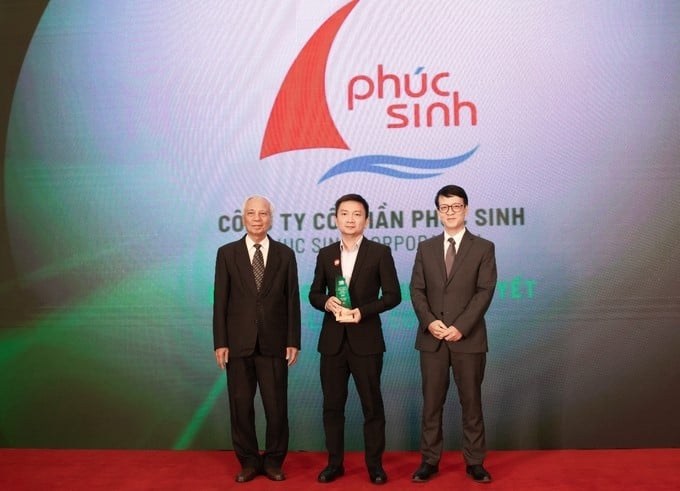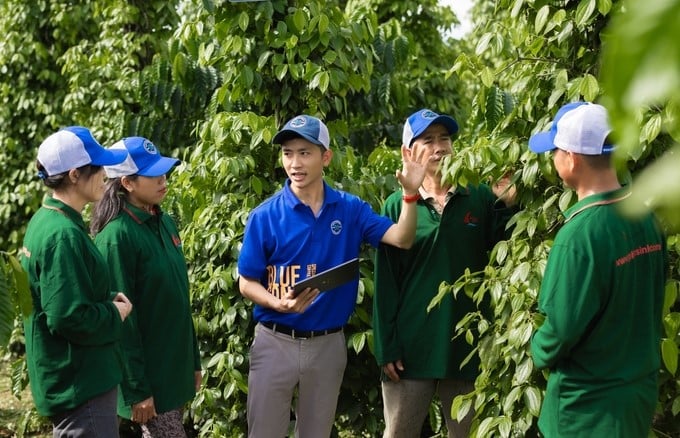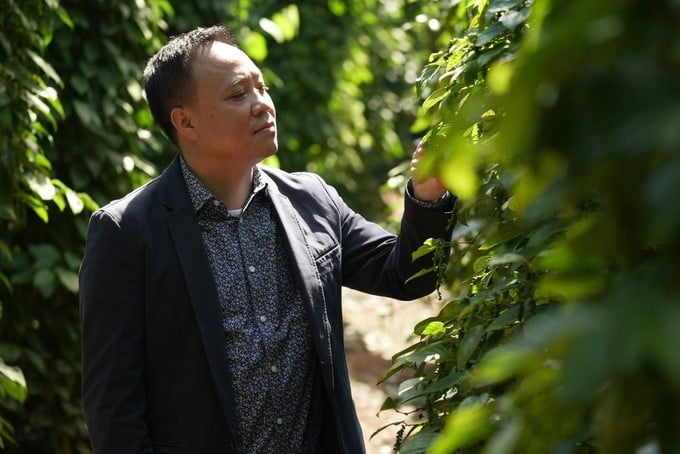December 4, 2025 | 12:40 GMT +7
December 4, 2025 | 12:40 GMT +7
Hotline: 0913.378.918
December 4, 2025 | 12:40 GMT +7
Hotline: 0913.378.918

Phuc Sinh Group receives the Sustainable Business Award 2024.
Phuc Sinh is the first Vietnamese business to receive funding from foreign countries for sustainable development goals. However, not when it has become a leading brand in the agricultural sector, Phuc Sinh Group pursues the thinking of a green economy. Because businessman Phan Minh Thong, founder of Phuc Sinh Group, has been aware of acting for the environment and the climate right from the start in 2001.
Vietnam has been a member of the WTO since 2007, which has created many opportunities for domestic businesses. However, they have also faced challenges of strict requirements on quality, food safety, and competition with foreign businesses. Besides that, climate change with drought, floods, and extreme weather has a serious impact on farmers' production and livelihoods, along with consequences from reduced biodiversity and chemical abuse in farming.
Facing the pressure from customers and the market, Phuc Sinh has implemented a sustainable development project to support farmers, protect the environment, and improve the value of Vietnamese coffee and pepper on the international market. The project not only meets the needs and improves product competitiveness but also helps farmers raise awareness, apply science and technology, focus on human rights, protect the environment and the ecosystem, and contribute to preserving natural resources for the next generations.
In 2010, Phuc Sinh started implementing the sustainable project in Dak Lak, facing many challenges about language and cultural differences when approaching local farmers. After the initial failure, the company was not discouraged but strengthened the local team and built trust with the community. In 2014, the project achieved UTZ certification (now Rainforest Alliance), helping farmers increase income, improve farming techniques, and raise awareness about environmental protection. The project not only increases the value of Vietnamese coffee but also attracts many international customers.
Phuc Sinh continued to expand the project to Dak Nong, Ba Ria-Vung Tau, and Son La provinces and expanded annually. The goal is to support sustainable livelihoods for farmers, raise awareness about environmental protection and climate change response, and promote organic farming. The company aims to develop green, clean, and sustainable agriculture, contributing to the sustainable development of Vietnamese agriculture.
Phuc Sinh Group has an initiative to build a circular economy model in coffee production in Son La. Taking advantage of Arabica coffee husks instead of leaving, Phuc Sinh has produced Cascara tea. This not only helps to reduce environmental pollution but also creates a high-value, profitable product, keeps the closed coffee production cycle, and does not generate ripe coffee waste.
At the same time, Phuc Sinh Group also deployed the model of growing organic pepper in the Central Highlands. In Dak Nong and Dak Lak, Phuc Sinh has supported the cost of organic fertilizer and biological pesticides for farmers and provided a team of experts to accompany. The project organized field training for farmers on organic farming techniques, risk management of pests and diseases, and environmental protection, thereby helping farmers improve productivity and product quality sustainably.

Phuc Sinh's experts guide techniques for farmers.
Phuc Sinh not only works with farmers in the project but also invites farmers not participating to learn and improve techniques. This extends the effects of the model on the surrounding community, raising people's awareness about environmental protection and sustainable agricultural development. Moreover, Phuc Sinh has created a close relationship with farmers and international customers, helping farmers understand the value of organic farming and bringing Vietnamese coffee products to the international market while building the image of Vietnam as a sustainable and environmentally friendly production place.
The initiatives of Phuc Sinh not only aim to improve the productivity and quality of coffee and pepper but also contribute to building a sustainable agricultural ecosystem, protecting the environment, improving the life of farmers, increasing income, raising awareness about environmental protection, etc. At the same time, build the direction of circular economic development in agricultural production, and build an environmentally friendly product chain. Thereby, Phuc Sinh aims for a sustainable future for Vietnam's agriculture.
In 2025, together entering the nation's era of reaching out, Phuc Sinh Group expected to continue expanding the coffee-growing model in Son La, focusing on the process of achieving organic certification. By 2030, a large number of organic-certified coffee gardens will be built to spread sustainable farming techniques and experience to more farmers.
Phuc Sinh's projects have brought higher income for coffee and pepper farmers and raised their awareness about health protection, environmental protection, and maintenance of biodiversity in the garden. This helps protect soil nutrition and reduces erosion and greenhouse gas emissions. In addition, people living around the project area also benefit from having the opportunity to access science and technology and directly observe the effectiveness of the sustainable farming process through models. The projects also help Phuc Sinh produce high-quality products, prominent in the international market, and achieve geographical indications with two products: Arabica Blue Son La Coffee and Cascara Blue Son La Tea.

Businessman Phan Minh Thong.
Phuc Sinh Group sets a goal of improving the knowledge of farmers in techniques and applying science and technology to sustainable farming, helping them to master the knowledge of organic agriculture. Thereby improving the production process, increasing productivity, reducing production costs, and enhancing biodiversity in the garden. Besides, it also helps farmers build awareness of environmental protection and natural resources protection, spread the spirit of sustainable agriculture, and adapt to climate change.
Businessman Phan Minh Thong shared, "Farmers increase their income thanks to sustainable farming, improve living standards, access scientific and technical knowledge, and apply it to farming. In addition, biodiversity and precious trees intercropped in the garden will increase the coverage (shade) for the garden, reduce greenhouse gas emissions, and bring high economic value for farmers in the future.
We encourage cooperation and connection between farmers, creating a stronger community, supporting and developing together to build an agricultural system in the sustainable, organic direction with a decrease in the use of chemical fertilizers and pesticides. Raise awareness about the importance of sustainable development and thereby change the habits and behaviors of the community. Because the voice and the spread between farmers are more connected to the voice from the business."
Phuc Sinh Group's sustainable development journey is not only about the profits but also positively spreads the spirit of clean products, green agriculture, fresh environment, and civilized community.
Translated by Thu Huyen

(VAN) After three years, Project FST/2020/123 collected approximately 3,000 insect specimens, classified them into about 50 morphological groups, and identified around 40 species, including several new species.
/2025/12/01/0509-2-175427_206.jpg)
(VAN) Emission-reducing coffee areas in Lam Dong have entered the new crop with stable yields, improved quality, and a remarkably enhanced cultivation environment.

(VAN) The Institute of Agricultural Sciences for Southern Vietnam (IAS) marked its 100th anniversary in Ho Chi Minh City, celebrating a century of growth as a leading institute contributing significantly to Viet Nam’s agricultural development.

(VAN) An increasing number of livestock farms are using biogas generators to create a source of renewable electricity, helping to save costs and mitigate environmental pollution.

(VAN) Small changes in rice cultivation, from irrigation methods and straw collection to input management, are paving a new way for Vietnam's agriculture in the journey toward emission reduction.

(VAN) With the project of converting biogas into renewable electricity, Australia is both helping pig farms reduce their energy costs by up to 25% and contributing to environmental protection.
![Hue aims for Net Zero: [1] Initial steps from green transportation](https://t.ex-cdn.com/nongnghiepmoitruong.vn/608w/files/huytd/2025/11/28/0853-anh-6-giao-thong-xanh-hue-094717_940-153724.jpg)
(VAN) For sustainable development, Hue City is implementing many solutions to promote green transportation, which is an important initial step on the journey to building a Net Zero Hue.